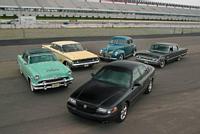Review 2003 Mercury Marauder
SEE ALSO Mercury Buyer's Guide
2003 Mercury Marauder Base price: $34,495 Price as tested: $35,045 EPA mileage: 17 city/23 highway By Des Toups Huge and menacing in shimmering black, the Mercury Marauder -- a name resurrected from the 1960s applied to a sedan that dates to the 1970s -- aims to recapture the glory of big honkin' American iron. As a tribute, it's almost flawless. There are reasons those of us old enough to remember the factory eight-track look back on behemoths such as these so fondly: their effortless power, their limitless elbow room, their unabashed excess. And those traits, packaged with modern fuel efficiency and tight handling, make a compelling case for the return of the fast full-size sedan. So it's hard not to fall a little in love with the idea of a Marauder, its lovely sounding V-8, its acres of leather seating, its astoundingly competent road manners. But the Marauder is, at its heart, an old car that went out of style without ever going out of production, and there are compromises inherent in its 24-year-old platform that keep it from being anything else. Instead, let's call it a good start, if this does indeed point to a future for the beleaguered, bewildered Mercury brand. All would be forgiven if the Marauder's engine made good on its promise; after all, 302 horsepower should be plenty. Yet stepping on the Marauder's gas pedal for the first time is like hearing Mike Tyson speak -- you were expecting so much more. Muscle cars earn their stripes at stoplights, but the Marauder's 281-cubic-inch V-8 doesn't really pull in earnest until about 40 mph. It sounds great (those chrome tips at the rear are a genuine dual exhaust), though that's small consolation when a kid in his mommy's Regal can nail you so easily. To spin the Marauder's fat rear tires, it's necessary to stand one foot on the brake and the other on the gas until the V-8 nears its power peak, then let go. Even then, the result is underwhelming. Around town, without the two-footed showboating, the Marauder feels merely quick. In a two-ton sedan, there's no substitute for torque, the muscle that actually moves the car. The Marauder delivers maximum thrust at 4,250 rpm; the eight-cylinder VW Passat, in contrast, peaks at 2,750 rpm. The difference in real-world driving is effort. The Mercury demands you put your foot to the floor before it feels fast; the VW feels fast all the time. Though the engine is in fact the most modern component of the Marauder, it's the nips and tucks to its frame and suspension that make it a blast to drive. The chief improvement is rack-and-pinion steering in place of the archaic recirculating-ball steering of yore. There's no more giant dead spot on center, and there's enough feedback to give you an idea of how hard the tires are working. All the big, rear-wheel-drive Fords (Marauder, Grand Marquis, Crown Victoria, Lincoln Town Car) share the revised steering, a revised front suspension and a stiffer frame that noticeably cuts the amount of jiggle that comes through the steering column. On top of that, the Marauder gets stiffer springs, bigger anti-roll bars and sport-tuned dampers. Flashy, 18-inch chrome wheels wear aggressive Goodrich T/A 50-series tires up front, 55 in back. Who'd have guessed a gussied-up Grand Marquis could feel so darned good on a mountain road? Not only are the car's limits high, they're approached without a lot of body roll or tire-squealing hysterics. A few runs through a parking-lot autocross proved the Marauder more than capable of chasing flyweight sports cars, despite its sheer size (six feet longer than a Mini Cooper), slippery, flat seats and lack of low-end power. The front end doesn't plow in tight corners; the rear end doesn't come around easily. Few sedans in this front-drive-heavy price range are as easy to drive quickly. But those front-drive sedans are the big Merc's competition for your $35,000, and if you care for grippy seats or first-class interior fittings, they win going away. The beautiful black leather in the Marauder wraps very flat, springy chairs, giving the driver a precarious-feeling perch in a car that otherwise demands to be flung about. The dashboard is blocky and dated, though the Marauder gets round, white-faced gauges and a floor-mounted shifter that help lighten the Granddad feel. Gaps between panels are huge, the radio is an arm's length away (some controls are duplicated on the steering wheel) and the metallic-mesh trim on the doors and dashboard looks cheap. Gas and brake pedals are height-adjustable, but they go from too high to way too high. And while the Marauder is among the biggest sedans on the road, rear-seat legroom is merely average, and a poorly placed spare eats up much of what should be a gargantuan trunk. Packaging like that isn't going to go away before the next redesign, but there's no reason Mercury can't refit the car's interior with more luxurious door panels, for instance, or add bolstering to the driver's seat. In fact, there's no reason not to add another 50 horsepower and better gearing to put it to the pavement. Go bold, Mercury, because as a family sedan, the Marauder has little besides familiarity and size to recommend it. As an outlandish anachronism, though, it's only 50 horsepower and a better interior away from being irresistible.



